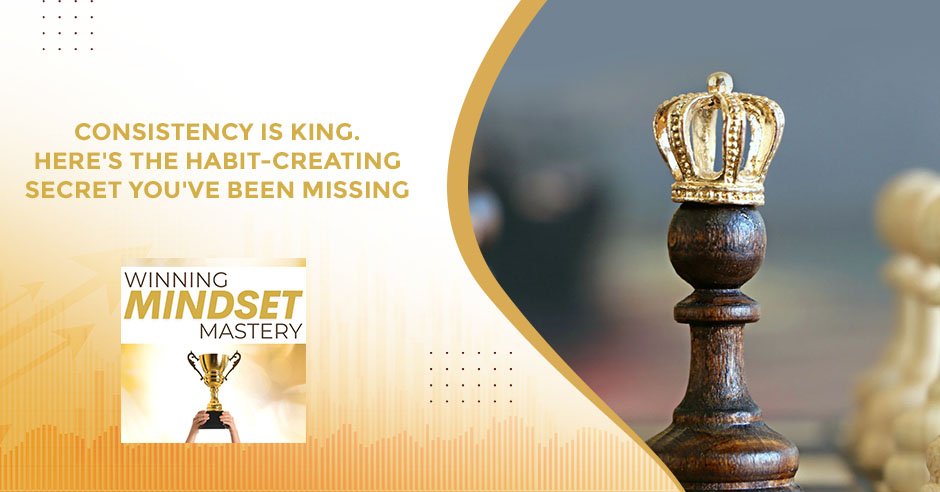
Ditch the idea that habits are all about mindless repetition! There’s a new secret weapon in town: positive emotions. This episode will reveal how to leverage the power of psychology to make habit building a joyful ride, not a chore. Discover how to identify habits that come naturally with a feel-good factor, and learn sneaky tricks to inject positivity into even the most mundane tasks. Unleash the winning mindset within you by harnessing the science of emotions to create habits you’ll love and finally achieve lasting success.
—
Listen to the podcast here
Consistency Is King. Here’s The Habit-Creating Secret You’ve Been Missing
Thank you for joining me. This week, I want to reframe the way that you look at creating a habit. This information is hot off the presses, at least to me. As someone who has always been trying to hack and use neuroscience and NLP in any way possible to develop good, powerful habits, I am thrilled to have this piece of information. For most of us, we’ve been told that the best way to develop a habit is repetition. Some schools of thought say 17 days, some say 21, and some say 60-something, whatever it is you believe, we usually correlate the behavior being done over and over again with developing that habit that’s long-lasting and allows us to have a great deal of success. There is a correlation 100% between the activity being repeated over and over again and building a habit, but there’s no causation.
Rethinking Habit Formation
It is not that repetitive activity that actually causes that habit to form, which was so interesting for me to learn. It was BJ Fogg, a social scientist and the director of the Behavior Design Lab at Stanford, who shared this. It makes so much sense when you really start to dive in and think about it because he said, “It’s not the repetitive action, it is the positive emotion that you associate with that repetitive action,” with that emotion, with that feeling that develops a habit that you’ll stick to.
That’s incredibly powerful because some of the easiest habits to develop are the ones that bring with them automatic good feelings. I think about exercise and maybe folks who love to run, you get a runner’s high. I think that only happened to me once or twice, but exercise overall gives you endorphins and you get this great sense of accomplishment.
That’s a habit that can be pretty easy to develop if you do it for just a short period of time because that good feeling is there almost automatically. It’s really that good feeling that ties that powerful emotion to the habit and makes us want to do it more and more and makes it easier for us to keep up with it. It’s funny, my dog, Cowboy, is definitely a creature of habit. As I think about this, it works for animals too because he’s very routine-based and there are certain things that he wants to happen at a certain time every day. Nothing is as big for him on a routine scale as when he eats. I’ll tell you, my dog does not like to do anything as much as he likes to eat. Maybe play, but I still think play is after eating.
Strategies For Building Habits With Positive Emotions
This makes so much sense in how it works with our brains, with animals’ brains, and with children’s brains. We can use this to our benefit from a mindset perspective because there are so many ways to work on your mindset that also help you feel incredibly good. One of them is the practice I talked about several episodes ago, where I talked about waking up and spending those first 30 seconds of your day thinking about the things that you appreciate, the things you’re grateful for in your life. That’s a practice that is easier to make a habit because when you’re done doing it, you feel much better about starting your day, even if you woke up in a good mood.
Another one that I’ve talked about is the act of sharing your three wins from the previous day, whether you’re sharing them just out loud with yourself, putting them in a journal, or sharing them with other people. When you’re focused on your wins, you not only put yourself in a better mindset, but it’s easier to form that habit because you have that positive emotion tied to it.
When you focus on your wins, you not only put yourself in a better mindset, but it's also easier to form that habit because you have that positive emotion tied to it. Share on XSome of the things that we want to do don’t easily have positive emotions tied to them, like eating broccoli or, for a kid, brushing your teeth. Think about how understanding the psychology around this can make it that much easier. We can make brushing our teeth as a child more of a game and celebrate at the end that you did it.
When you’re trying to do something that is important for you but doesn’t have that just integrated feel-good feeling to it, let yourself celebrate a little bit at the end that you did it. If it’s trying to keep your car cleaned out and you did it for a day or did it for a week, giving yourself a congratulation or a reward or anything that emotionally makes you feel great about it will make it so much easier for you to keep doing it. I love this as a practice, and I love that there is yet another way that we can make practicing consistent habits that work for us easier and continue on that winning mindset journey with yet another tool that we have.
Try this out. Try to find good-feeling things that you can associate with the habits that you’re trying to build and let me know how it works for you. Come on over to the website, WinningMindsetMasteryPodcast.com. At the very bottom, as I’ve been sharing with you, there is an Ask April section where you can record a quick message in your own voice. Tell me how it’s going. Ask me a question, and I can answer you that same way, privately and personally, and we can have a two-way conversation about how these tools are working for you. I can’t wait to find out. Here’s to your success.





